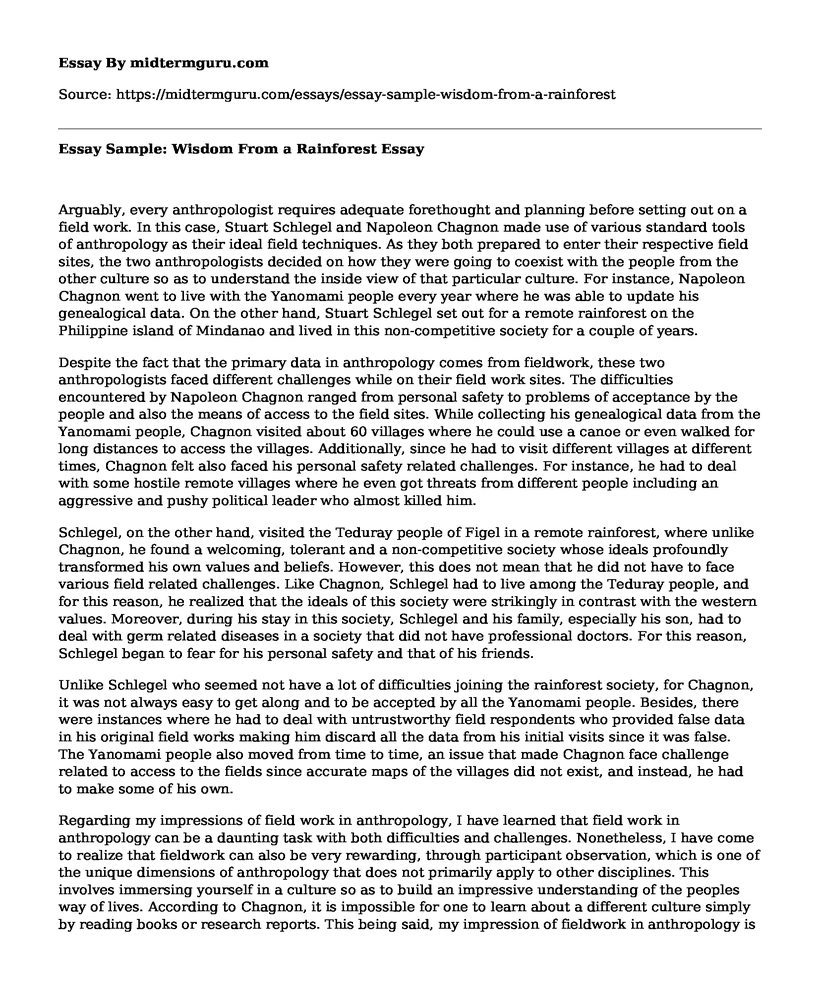Arguably, every anthropologist requires adequate forethought and planning before setting out on a field work. In this case, Stuart Schlegel and Napoleon Chagnon made use of various standard tools of anthropology as their ideal field techniques. As they both prepared to enter their respective field sites, the two anthropologists decided on how they were going to coexist with the people from the other culture so as to understand the inside view of that particular culture. For instance, Napoleon Chagnon went to live with the Yanomami people every year where he was able to update his genealogical data. On the other hand, Stuart Schlegel set out for a remote rainforest on the Philippine island of Mindanao and lived in this non-competitive society for a couple of years.
Despite the fact that the primary data in anthropology comes from fieldwork, these two anthropologists faced different challenges while on their field work sites. The difficulties encountered by Napoleon Chagnon ranged from personal safety to problems of acceptance by the people and also the means of access to the field sites. While collecting his genealogical data from the Yanomami people, Chagnon visited about 60 villages where he could use a canoe or even walked for long distances to access the villages. Additionally, since he had to visit different villages at different times, Chagnon felt also faced his personal safety related challenges. For instance, he had to deal with some hostile remote villages where he even got threats from different people including an aggressive and pushy political leader who almost killed him.
Schlegel, on the other hand, visited the Teduray people of Figel in a remote rainforest, where unlike Chagnon, he found a welcoming, tolerant and a non-competitive society whose ideals profoundly transformed his own values and beliefs. However, this does not mean that he did not have to face various field related challenges. Like Chagnon, Schlegel had to live among the Teduray people, and for this reason, he realized that the ideals of this society were strikingly in contrast with the western values. Moreover, during his stay in this society, Schlegel and his family, especially his son, had to deal with germ related diseases in a society that did not have professional doctors. For this reason, Schlegel began to fear for his personal safety and that of his friends.
Unlike Schlegel who seemed not have a lot of difficulties joining the rainforest society, for Chagnon, it was not always easy to get along and to be accepted by all the Yanomami people. Besides, there were instances where he had to deal with untrustworthy field respondents who provided false data in his original field works making him discard all the data from his initial visits since it was false. The Yanomami people also moved from time to time, an issue that made Chagnon face challenge related to access to the fields since accurate maps of the villages did not exist, and instead, he had to make some of his own.
Regarding my impressions of field work in anthropology, I have learned that field work in anthropology can be a daunting task with both difficulties and challenges. Nonetheless, I have come to realize that fieldwork can also be very rewarding, through participant observation, which is one of the unique dimensions of anthropology that does not primarily apply to other disciplines. This involves immersing yourself in a culture so as to build an impressive understanding of the peoples way of lives. According to Chagnon, it is impossible for one to learn about a different culture simply by reading books or research reports. This being said, my impression of fieldwork in anthropology is that it requires one to become an active participant in the society or the field site in which they seek to conduct fieldwork on. This, in essence, helps one in building an impressive understanding of the distinctive traits and nature of the people being studied.
Finally, from both Chagnons and Schlegel's experiences, I have learned that every anthropologist has a primary responsibility and obligation, in communicating fundamental concepts to cultural relativism.
Cite this page
Essay Sample: Wisdom From a Rainforest. (2021, Jun 03). Retrieved from https://midtermguru.com/essays/essay-sample-wisdom-from-a-rainforest
If you are the original author of this essay and no longer wish to have it published on the midtermguru.com website, please click below to request its removal:
- Using Non-Local Density Function Theory - Chemistry Paper Example
- Essay on Newly Implemented Executive Order on Immigration
- Discovering the Universe - Paper Example
- Color of Food in Chemistry - Paper Example
- Mathematics and Society - Essay Sample
- Anthropocentrism: Human-Centric Environmental Responsibility - Essay Sample
- Understanding Cultural Anthropology: Ethical Methods & Code of Ethics - Essay Sample







